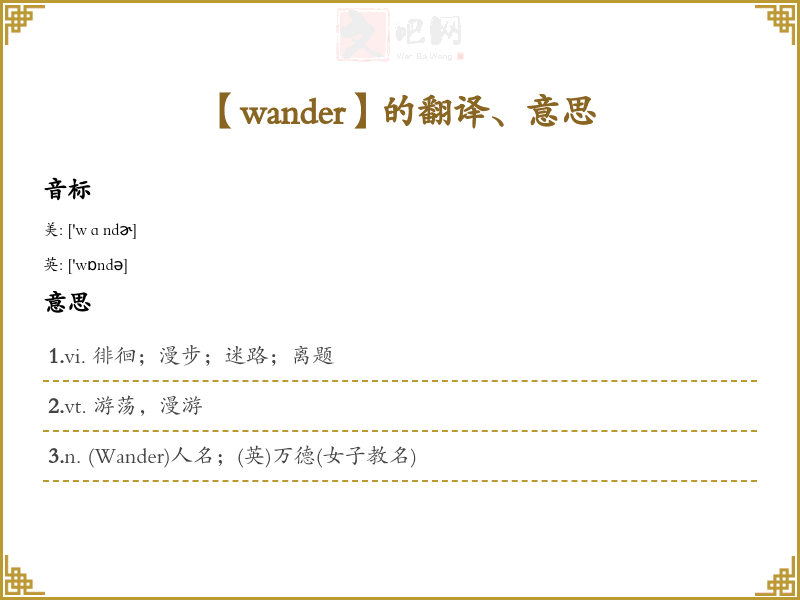【wander】的翻译、意思
时间: 2025-04-25 17:56:47
【wander】怎么读
美:['wɑndɚ]
英:['wɒndə]
【wander】是什么意思、字义解释
1. vi. 徘徊;漫步;迷路;离题
2. vt. 游荡,漫游
3. n. (Wander)人名;(英)万德(女子教名)
【wander】的详细解释
英文单词学*与分析:[wander]
1. 基本定义:
- 字面意思:wander的字面意思是“漫步”或“游荡”,指的是没有明确目的地地走动或移动。
- 词性:动词(verb)
2. 词源与起源:
-
词源分析:wander源自古英语“wandrian”,意为“徘徊、流浪”。它可能与德语的“wandern”(意为“远足”)和荷兰语的“wandelen”有关。其词根“wand”可以追溯到意为“移动”、“走”的概念。
-
历史背景:wander首次出现在英语文献中大约在12世纪,常用于描述人们在无目的地漫步或旅行的行为。
-
课本:该词可能出现在初中到高中阶段的英语教材中,尤其是在讲述旅行、自然景观或人物心理状态的课文中。牛津和美国的教材中也会出现wander,通常在与旅行或探险相关的单元中。
3. 使用场景:
-
正式与非正式语境:
- 正式语境:在文学作品或学术文章中,wander可以用来描绘角色的内心挣扎或探索的过程。例如,诗人可能会写道:“He wandered through the fields, lost in thought.”(他在田野中徘徊,沉浸在思考中。)
- 非正式语境:在日常对话中,wander通常用于描述随意的散步或无目的的旅行,例如:“Let’s wander around the city this weekend.”(这个周末我们去城里随便逛逛吧。)
-
特殊场合:在心理学领域,wander可用于描述思维的随机性,比如“mind wandering”(思维漫游),指的是思维在没有意识控制的情况下游离于当前任务之外。
4. 示例句子:
- “I often wander in the park to clear my mind.”
- “我经常在公园漫步以清醒头脑。”
- “The child wandered away from his parents in the crowded market.”
- “那个孩子在拥挤的市场中离开了父母。”
- “As I wandered through the ancient ruins, I felt a deep sense of history.”
- “当我在古老的遗址中游荡时,我感到一种深深的历史感。”
- “Her thoughts began to wander during the lecture.”
- “她在讲座中开始走神。”
- “They wandered along the beach, enjoying the sunset.”
- “他们在海滩上漫步,享受日落。”
*. “He wandered into the wrong room by mistake.” - “他不小心走进了错误的房间。”
- “他们在海滩上漫步,享受日落。”
- “Wanderlust drove her to travel to distant lands.”
- “对旅行的渴望促使她去遥远的土地。”
- “The artist's mind often wanders to abstract concepts.”
- “这位艺术家的思维常常游走于抽象概念。”
- “We spent the afternoon wandering through the art gallery.”
- “我们花了一个下午在艺术画廊闲逛。”
- “He has a tendency to wander off during conversations.”
- “他在谈话中常常走神。”
5. 同义词与反义词:
-
同义词:
- roam:指在广阔区域内自由移动,通常带有探索的含义。
- stroll:指轻松地走,通常是为了享受周围的环境。
- drift:通常指在没有明确目的地的情况下随意移动,带有轻松和无拘束的感觉。
-
反义词:
- stay:指保持在一个地方,不移动。
- settle:指安定下来,通常意味着不再四处游荡。
. 学方法教学:
选择音标记忆法:
- 音标:/ˈwɒndər/
- 通过分解音节来记忆这个词:将“wander”拆分为“wan”和“der”,可以联想成“我在‘wan’(想要)‘der’(游荡)”。
7. 关联词汇:
- 常用搭配:
- wander around(随处游荡)
- wander off(走开/走散)
- wanderlust(旅行的渴望)
- aimlessly wander(无目的地游荡)
- wander in thought(思维游离)
以上是关于“wander”这个词的详细分析与学,希望对你的学有所帮助!
【wander】例句
1、[V-T/V-I] If you wander in a place, you walk around there in a casual way, often without intending to go in any particular direction. 漫步
-
例:When he got bored he wandered around the fair.烦闷时,他便在集市上四处闲逛。
-
例:They wandered off in the direction of the nearest shop.他们朝着最近那家店铺的方向闲逛去了。
-
例:People wandered the streets aimlessly.人们在街上漫无目的地闲逛。
2、[N-SING] Wander is also a noun. 漫步
-
例:A wander around any market will reveal stalls piled high with vegetables.在哪个市场上闲逛都会发现高高堆着蔬菜的摊子。
3、[V-I] If a person or animal wanders from a place where they are supposed to stay, they move away from the place without going in a particular direction. 走开
-
例:Because Mother is afraid we'll get lost, we aren't allowed to wander far.母亲因为害怕我们走丢了,不准我们走远。
4、[V-I] If your mind wanders or your thoughts wander, you stop concentrating on something and start thinking about other things. 心不在焉
-
例:His mind would wander, and he would lose track of what he was doing.他会心不在焉起来,忘了自己刚才正在干什么。
5、[V-I] If your eyes wander, you stop looking at one thing and start looking around at other things. (目光) 无目的地移动
-
例:His eyes wandered restlessly around the room.他的眼睛不停地打量着房间。
